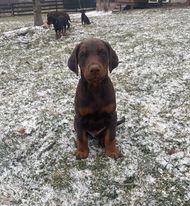Teaching your dog to eliminate outdoors takes patience, common sense, and realistic expectations. Housetraining is your dog’s first training experience and it is important that you make this first experience a good one.
It is important to watch your puppy and get to know his needs. Puppies generally need to go out to urinate/defecate after play, after eating or drinking, and after sleeping. During the ages of 10 weeks to 4½ months old, you may be out as often as every hour during daylight hours if your puppy is not in his crate.
When the puppy is really young (under 12 weeks of age), you may need to take him out during the evening as well. All puppies are individuals and they all take different amounts of time to train. Prevention of accidents is the key to teaching your puppy good housetraining habits.
When he does have an accident, don’t scold, just clean up the accident while the puppy is not present and be sure and use something that will neutralize the odor. (There are commercial products out there to do this, but you can also use vinegar and water.) Make note of when that accident was and watch for a repeat behavior the next time. Just be aware that every time your puppy eliminates in the house, you have just set back his housetraining a little further. Prevention is training. Take your puppy out often.
Here is an outline of how to put your dog on a good housetraining schedule:
You should initially decide how you are going to confine your puppy when you are not around. Using a crate or kennel is the best method. 
Make the crate a pleasant place. A crate is the most comfortable and secure place to confine your puppy or dog. Dogs have a natural instinct to be in a den, and a crate fulfills that need. Don’t expect, though, that your puppy will initially feel that way! He may scream and cry when you put him in there. Just try to ignore the noise. When he sees that crying and screaming does not get him out, that behavior will go away.
My Doberman Treasure was crate trained within hours. My Australian Shepherd, Phlip took three noisy days!
The puppy should be confined whenever you cannot supervise him. This space can be considered a “playpen.” It prevents him from destructive mischief as well as from getting into dangerous household products or poisonous plants. Always keep a few chew toys in this space. It also helps to feed your puppy in his crate.
Put him on a regular feeding and watering schedule. Remember what goes in must go out. If your puppy is not making it through the night, you may want to stop giving him water by 7:00 p.m. Always take your puppy out to eliminate after being in the crate before you let him run around the house again. Usually, the puppy will eliminate and defecate every time he eats.
Next put him on an elimination schedule. Take him out at the same time every day (remember after meals and after sleep). It helps if you take the puppy outdoors each and every time you take him out of the crate. Go right outdoors and use words like “hurry up” and praise him when he eliminates. Take him to the same spot every time, and encourage softly with whatever words you choose.
I also recommend that you keep him on leash even if you are out in a fenced yard. This way the puppy doesn’t get too involved in sniffing, chewing, chasing leaves, etc. and forgets what he is outside for. Once he has eliminated, give him the freedom to run around. It should be safe to let him have his freedom in part of your house for the next 20 minutes to an hour (depending on how old your pup is). If you ever bring him out to go to the bathroom and he doesn’t go, quietly return him to the crate, wait 10-20 minutes and take him outside again.
Be consistent. Housetraining takes time, patience, and consistency. Don’t mix methods; this will only confuse your puppy. If your puppy is still “having accidents” after a couple of weeks, try to figure out why. Was it something you did wrong? Is there something the puppy doesn’t understand?
Also, puppies and dogs can get urinary tract infections and that is something to consider if your puppy has frequent urinations (frequent would be several in an hour and cannot keep his crate dry).
If you continue to struggle with housetraining with your puppy or dog, please consider a private consultation here at the training center of via zoom. I would love the opportunity to help you!





